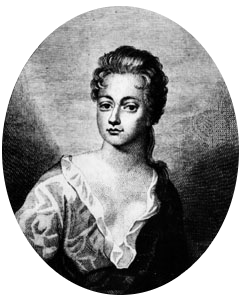Related Research Articles
Susanna Verbruggen, aka Susanna Mountfort, was an English actress working in London.

Anne Bracegirdle was an English actress.
Mary Kent was an English actress, whose career lasted from 1692 to 1718. Her dates of birth and death are not known. She was the wife of Drury Lane actor Thomas Kent.

Robert Wilks was a British actor and theatrical manager who was one of the leading managers of Theatre Royal, Drury Lane in its heyday of the 1710s. He was, with Colley Cibber and Thomas Doggett, one of the "triumvirate" of actor-managers that was denounced by Alexander Pope and caricatured by William Hogarth as leaders of the decline in theatrical standards and degradation of the stage's literary tradition.
John Mills (c.1670–1736) was a British stage actor. A long-standing part of the Drury Lane company from 1695 until his death, he appeared in both comedies and tragedies. His wife Margaret Mills was an actress, and his son William Mills also became an actor at Drury Lane.
John Bowman (1651–1739) was a British stage actor. He began his career in the Duke's Company at the Dorset Garden Theatre. In 1692, he married Elizabeth Watson, who acted under the name Elizabeth Bowman. He later switched to act at the Drury Lane Theatre. He is also referred to as John Boman.
Thomas Smith was a British stage actor of the eighteenth century.
Mary Powell was an English stage actor of the seventeenth century and early eighteenth century.
Jane Rogers was an English stage actress. To distinguish her from her daughter she is sometimes referred to as Jane Rogers the Elder.
Joseph Williams was an English stage actor of the seventeenth and early eighteenth century.
Elizabeth Willis (c.1669-1739) was a British stage actress.
John Thurmond was a British stage actor. To distinguish him from his son, also an actor named John, he is sometimes called John Thurmond the Elder.
Matthew Medbourne was an English stage actor and occasional playwright of the Restoration era. A long-standing member of the Duke's Theatre, Medbourne was a victim of the Popish Plot scare and died in Newgate Prison.
Abigail Lawson was an English stage actor of the seventeenth and early eighteenth century. She was a member of the United Company, making her first known appearance in The Marriage-Hater Matched by Thomas D'Urfey in 1692. From 1695 she was part of Thomas Betterton's breakaway company at the Lincoln's Inn Fields Theatre.
Philip Griffin was an English stage actor of the seventeenth century and early eighteenth century. He joined the King's Company at Drury Lane during the 1670s, and was later a member of the merged United Company from 1685. He was named as a manager at Drury Lane in 1695, but then took military service and was styled as Captain Griffin. In 1699 he went to act in Dublin as part of Joseph Ashbury's company at the Smock Alley Theatre, but was back in London where he acted until retired from the stage in 1707.
John Hodgson was an English stage actor of the late seventeenth century. He joined the United Company in 1688 and his first recorded appearance was in The Treacherous Brothers at Drury Lane in 1690. In 1695 he was one of several actors who broke away to join Thomas Betterton's new company at Lincoln's Inn Fields. His name is sometimes written as Hudson. He was married to the singer Mary Hodgson.
Joseph Harris (c.1650–1715) was an English stage actor and playwright. His earliest known performance was in the United Company's The Bloody Brother in 1685. Earlier mentions an actor named Harris are likely to refer to an earlier lesser-known actor William Harris or even the celebrated Restoration performer Henry Harris. He remained with the United Company until 1695 when he joined Thomas Betterton's breakaway company at the Lincoln's Inn Fields Theatre. He acted there until around 1705, although some reports have him still acting as late as 1715.

Henry Harris was an English stage actor and theatre manager. Initially a painter he was a founder member of the new Duke's Company in 1660 following the Restoration which established itself at the old Salisbury Court Theatre before moving to the new Lincoln's Inn Fields Theatre shortly afterwards. Due to his background Harris may have been a set designer and painter during his early years with the company. However, by 1661 he was acting, and his first recorded role was in William Davenant's The Siege of Rhodes that summer. He quickly established himself as the second actor in the troupe after Thomas Betterton.
Jane Lucas was an English stage actress and singer of the late seventeenth and early eighteenth century. From around 1693 she was a member of the United Company based at the Theatre Royal, Drury Lane. In 1697 she had fellow actor Colley Cibber arrested, although the reason was not clear and she remained acting in the company alongside him for some years afterwards.
John Coysh was an English stage actor of the seventeenth century. He was a member of the King's Company, based at the Theatre Royal, Drury Lane.